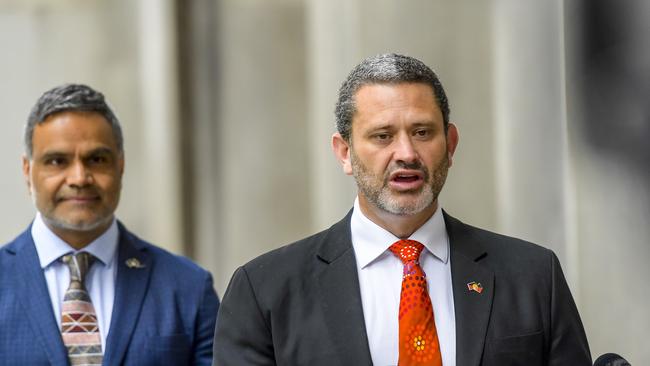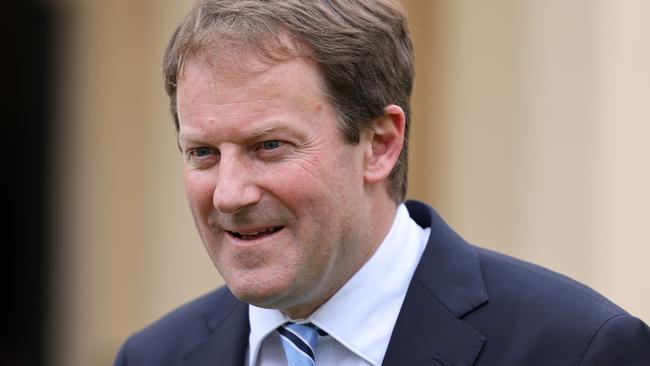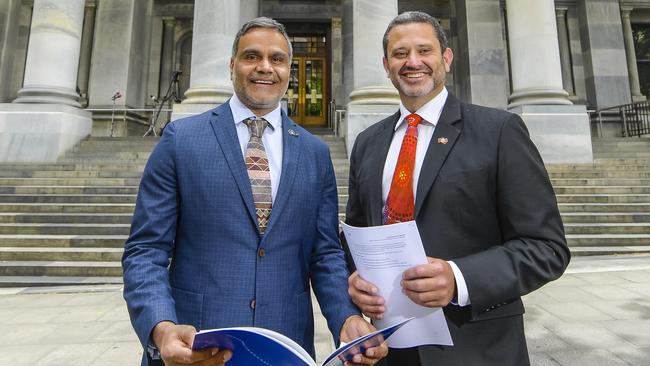Special Sunday parliament sitting to pass SA’s Voice legislation
SA’s First Nations Voice is set to pass into law – with a special Sunday sitting for parliament planned. But the Opposition has questioned the cost.
SA News
Don't miss out on the headlines from SA News. Followed categories will be added to My News.
A special sitting for state parliament will be held on Sunday, March 26, for what is expected to be the passing of the First Nations Voice Bill 2023 into South Australian legislation.
Both the upper and lower house will conduct business as usual, with a smoking ceremony set to be held on the steps of state parliament once the Voice passes to mark the occasion.
On Wednesday, Aboriginal Affairs Minister and Attorney-General, Kyam Maher said it would be an open invite for all South Australians.
“The passing of the South Australian First Nations Voice to parliament will be a significant event in both our state and nation’s history,” he said.
“To mark this nation leading reform, the government intends to have a special sitting of parliament on a Sunday to allow as many First Nations South Australians and all other South Australians to witness this historic event.
“Discussions are underway with the Speaker of the House of Assembly, the President of the Legislative Council, and others in regards to preparation for this special sitting.”
On Tuesday during the Bill’s introduction to the lower house, Opposition Aboriginal Affairs spokesman Josh Teague reaffirmed that the Opposition opposed the Voice, and said it was a “defective model” that would not achieve practical outcomes for Indigenous people.
On Wednesday, Mr Teague questioned what it would cost taxpayers to hold a parliamentary sitting at the weekend, and said practical outcomes still remained a “priority” for his party.
“The state government has raised the idea of convening parliament on a Sunday for the sole purpose of concluding debate on a Bill,” he said.
“There is no detail on how much this unusual occasion would cost taxpayers, or if public servants will be forced to work on the Sunday, and if they will be paid penalty rates to do so.
“Ultimately, the state government has the power to decide the sitting schedule and our actions will be consistent with our respect for the institution of the parliament.
“Improved outcomes for Aboriginal people must be the priority.
“Reconciliation and action to extend Aboriginal engagement should be characterised by unity and humility, not partisanship and grandiosity.”
The state’s First Nations Voice will be made up of representatives from local First Nations Voices, and would have the ability to address either house of parliament on any Bill that is of concern to First Nations people in SA.
First Nations Bill introduced to lower house in state parliament
The debate has begun as a bill to enshrine a South Australian First Nations Voice to Parliament was introduced to the lower house by Premier Peter Malinauskas on Tuesday.
Mr Malinauskas detailed the changes to the First Nations Voice Bill 2023, and said previous governments both state and federally had failed to adequately address the longstanding issues facing Indigenous Australians.
“This is about accepting that however well intentioned attempts to improve the lives of our First Nations people have been, they have not brought about the urgent change that the circumstances demand,” he said.
“We must have humility enough to say that what we have been doing has not been working well enough.”
Mr Malinauskas addressed final changes to the Bill after two rounds of consultation and engagement with Aboriginal communities across the state by Commissioner for a First Voice, Dale Agius.

Changes included the wording around the definition of Aboriginal people, and how the Voice would interact with Native Title bodies.
“The definitions of ‘Aboriginal person and country’ have been replaced with ‘First Nations person’ and ‘traditional owner’,” he said.
“The definition of First Nations persons adopts the tripartite test, as stated by Justice Brennan in Mabo v Queensland number two, and is commonly used by governments all around Australia.
“The Voice does not limit or otherwise affect the functions of any First Nations persons or bodies under any other act of war, or an agreement or arrangement entered into or relating to First Nations persons or bodies, such as Native Title agreements.”
He also listed the three key principles in which the Voice would abide and function by.
“(Firstly, the Voice must be underpinned by self-determination, and as such, representatives must be chosen by First Nations communities themselves.
“Secondly, the Voice must come from the grassroots level and must be able to speak for local issues.
“Thirdly, the Voice must reflect the diversity of First Nations communities … it must reflect regional issues and speak for men’s and women’s issues, as well as for elders and young people.”

SA Voice Bill passes upper house
A First Nation’s Voice in South Australia is a step closer to becoming a reality after passing through the upper house in state parliament on Thursday.
In a major milestone, SA’s Legislative Council voted in support of the proposal, with the Bill set to move to the lower house in the next sitting week of parliament.
Attorney-General and Aboriginal Affairs Minister Kyam Maher said it was a “significant moment” in the state’s history, and would progress towards “stronger” and “improved relations between Aboriginal and non-Aboriginal people”.
“We are leading the nation in our delivery of a First Nations Voice to Parliament,” he said.
“Never before has a house of parliament in an Australian state or territory given endorsement to a model of this nature, and it’s especially pleasing to see so many members of our Legislative Council endorse this much-needed body.
“We still have a long way to go, but I welcome this significant step forward to giving our First Nations people the Voice they deserve in state parliament.

Under the model, the state’s First Nations Voice would be made up of representatives from local First Nations Voices, and would have the ability to address either house of parliament on any specific Bill that is of concern to First Nations people in SA.
Liberal MLC Dennis Hood said he still disagreed with the model of the Bill, but ultimately wanted better outcomes for Aboriginal people in SA.
“I made it very clear that I oppose this Bill and that remains my position,” he said.
“And I think it wouldn’t take a genius either to work out that, given the numbers in the other place (lower house), that it’s likely to pass the House of Assembly in a week or two or whenever that time is.
“So that being the case, I just want to say that it’s my intention to fully get behind this Bill and support the outcome.
“The disagreement here is about the way of achieving what we all want, I think, which is improved outcomes for our Indigenous population.”
The state opposition’s claims the First Nations Voice Bill had been “rushed” was the focus of parliamentary debate earlier in the day.
Liberal MLC Michelle Lensink asked why the Voice had to be “passed now”, when there were still “outstanding concerns” by Native Title holders.
In response, Mr Maher said there was a “thorough” consultation process, and “some of the concerns” raised by Native Title holders had been considered and would be implemented in the final legislation.
“Two rounds of consultation, one to design the legislation then a further round over a number of months about the legislation passed specifically,” he said.
“This has been many months of not just development, but consultation on an actual model of the bill.
“This is nearly six years since the Uluru Statement … it’s six months of extensive consultation, and for 187 years, I think Aboriginal people’s voice hasn’t been heard properly, so we need to get this thing going.”
Mr Maher also reaffirmed that the Voice would be an advisory-only body and that the boundaries for regions were still being developed in close consultation with traditional owners.
More Coverage
Originally published as Special Sunday parliament sitting to pass SA’s Voice legislation





